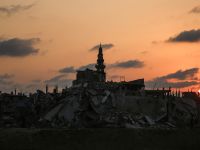By Clare Pedrick
LUGANO, Switzerland (WNL) -- As the bloodshed in the Middle East spilled over into a second month, commentators warned that the violence looked set to escalate into a far more serious conflict than the Intifada rebellion by stone-throwing Palestinians during the late 1980s and early 1990s. With at least 160 people killed so far in the clashes, almost all of them Palestinians, hopes are fading of an early end to the troubles.
Israeli Prime Minister Ehud Barak's efforts to shore up his critical political position by attempting to forge an emergency coalition government with hardliner Ariel Sharon did nothing to allay fears that the crisis will be a long and a bitter one. The hawkish Sharon, who sparked the current uprising by staging a visit to Jerusalem's al-Aqsa mosque on Sept. 28, is hated by Palestinians for his role in the 1982 Israeli invasion of Lebanon and the massacre of Palestinian men, women and children at refugee camps in Sabra and Shatila.
Barak's left-of-center Labor Party needs the support of Sharon's rightwing Likud party to stay in power, due to his own weak position in the Israeli parliament, where the number of his supporters has fallen to just 30 out of the total 120. Earlier this week (Mon Oct. 30), negotiations between the two Israeli parties failed, but both Sharon and Barak have said they might try again to form a governing partnership. For the next few weeks, Barak has won a stay of execution by obtaining a promise from the opposition party Shas to give him temporary support in parliament.
Opponents of the Barak-Sharon plan say that an alliance between the two would spell the end to any hopes of an Arab-Israeli peace deal, in spite of protestations by Barak that his efforts to reach a peace agreement with the Palestinians would continue. Sharon is strongly opposed to the settlement originally agreed between Barak's government and the Palestinians, which would have swapped West Bank land occupied by the Israelis for peace.
This week, international efforts to end the violence and resume negotiations continued, but without any real prospect of a resolution to the crisis. Whatever the outcome of the political emergency in Israel, hopes for a revival of the peace process look increasingly dim. On Sunday (Oct. 29), Barak himself announced a suspension in negotiations for what he described as a reevaluation, while Palestine Liberation Organization (PLO) leader Yasser Arafat upped the stakes by announcing he would only consider a deal if the contested city of Jerusalem was given to the Palestinians as their capital, a demand unlikely to be accepted by the Israelis.
Prof. Vittorio Dan Segre, head of the Institute for Mediterranean Studies and a longtime observer of the Arab-Israeli conflict, is among commentators who predict that the latest flare-up will be one of the worst in recent history. And he warned that the carnage could well spread to other parts of the globe, sweeping along more innocent victims in its path.
In an interview from the Switzerland-based think tank's headquarters in Lugano, Prof. Segre spoke about his fears for the coming months, and outlined the dilemmas facing some of the conflict's main players.
QUESTION: Why do you think the Middle East crisis has exploded at this particular time?
ANSWER: "I do not think the timing is very significant, because this is a war which has lasted for 50 years, and so any time would be good for things to explode. There is an accumulation of hopes and frustrations -- and this is not the first time -- and whenever hopes for an agreement reach a point of irreversibility, then the opponents of this peace process can only strengthen their opposition... Fundamentally, there is still a very strong current in Palestinian society -- and also outside Palestinian society -- which says that Israel has no right to exist, and these forces gather momentum whenever there is hope for a new agreement.”
Q.: What in your view are the chances of a new wave of terrorism, outside the main Middle Eastern arena, as a backlash of this crisis?
A.: "I think there is a very very high probability. This is a war which cannot be won by the parties. It will drag on, and as it drags on, people will become more and more frustrated by the fact that they cannot achieve their aims, and they will turn to terrorism, which is the weapon of those who have lost hope. There is a very strong possibility that terrorism will again appear on the local and the international scene. The banality of the places (where terrorists might strike) is one of the horrible aspects of our time. The places will be those where people cannot defend themselves -- civilians, children in schools -- since the essence of terrorism is cowardice.”
Q.: How do you see the possible entry of rightwing Israeli Ariel Sharon into the government of Ehud Barak, given his past record and his role in the massacres at the Palestian refugee camps in Lebanon of Sabra and Chatila?
A.: "I think it is the only possible -- though not yet certain --way that Premier Barak can tie him up, because if he is out (of the Israeli government), then the alternative will inevitably be new elections. And if new elections take place at this time, the victory of the right, and perhaps the extreme right, is certain. Like everything in the Arab-Israeli conflict, there is a symbolic and a practical aspect. If he (Sharon) comes into the government, then obviously it is the symbol of the hard man, the persecutor, the man of Sabra and Chatila. But let's not forget that politics is the art of the possible and that if, as a symbol he appears as a hardliner, he may actually be far more flexible in government. In any case, I don't think the prime minister of Israel has many alternatives.”
Q.: What effect will the upcoming elections in the US have on the unfolding crisis? And do you think it would be preferable to have a particular winner -- Al Gore or George Bush, as far as the situation in thee Middle East is
concerned?
A.: "I think the US elections can only increase the void for action. The relationships between the US, Israel and the Middle East are dictated by interest, not personalities. For Americans, peace is a must in the Middle East, but also for the Arabs. The methodology -- how to achieve that peace -- is the point in question.”
Q.: Why do you think PLO leader Yasser Arafat is behaving as he is? Do you think he still has credibility, or is he now a spent force?
A.: "I think it is very, very difficult for a national leader who has been turned into a symbol to accept the transition into the practical. It has been said that Arafat has a choice between imitating Che Guevara, who is an immortal image of a hero, and Fidel Castro, who is a president who has to deal not only with ideology, but with sewage, schools and monetary matters. For a man, it is much better to enter history as a hero than as the president of a small state, which has a lot of enemies and opponents and a lot of dirty problems...Arafat is looking at what happens, and he is not particularly present -- when the crisis started, he was in Spain and he did not hurry back. He is watching the situation. I do not know whether he does not know how to control it -- I think the situation is such that he cannot control it.”
Q.: Do you agree with those who predict that the Palestinian revolt will be worse this time around?
A.: "Yes, for two reasons. Partly because this is a revolt with weapons on both sides. Let's not forget that behind the (Palestinian) young people and the women; there are thousands of armed people. But on a much deeper level, this is a conflict of two truths: a Palestinian truth, which says that you cannot get a state on a silver platter. It says that a state, in order to have its dignity, must be born in blood, in suffering and in fury...And there is an Israeli truth which says, 'we tried our best; we went as far as we could go, but let's not forget that we are in a state of war with the Palestinians. They have never signed peace with us.' There is a war, and wars are either won or lost. A war cannot be discussed or negotiated. Peace can be negotiated, war no. It is this clash of two truths that makes this crisis much worse than the previous one.”
Q.: How will this crisis affect the birth of the Palestinian state?
A.: "I think it is already here. The state of the Palestinian people is practically a reality. What it lacks is partial international recognition, and the recognition of Israel, which is the most important one, because the Palestinians are embedded in Israeli structures -- economically, politically and militarily. Things will not change just because of an official declaration.”
© 2000 Al Bawaba (www.albawaba.com)







